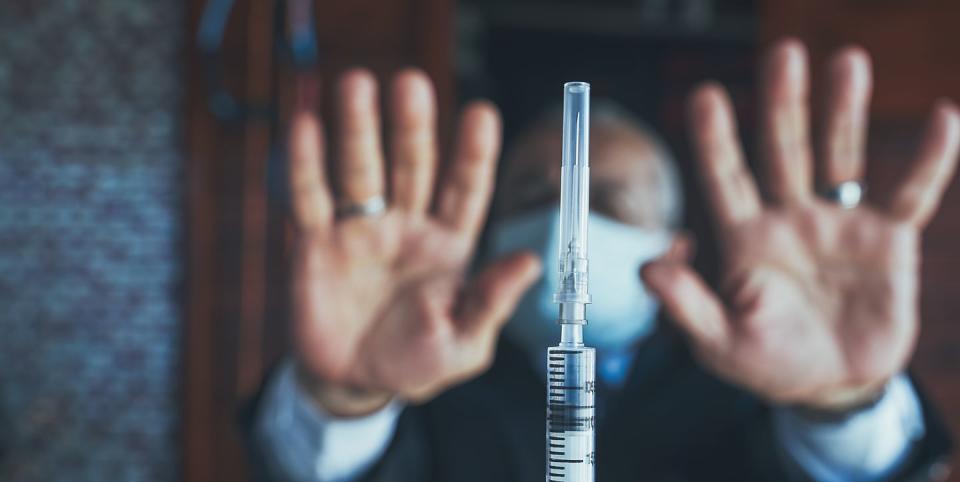Anti-Vaxxers Could Be Helping Create Deadlier Versions of Covid

We may someday look back on the hell year of 2020 as the year with the fewest covid deaths. That’s because of the high rates of people who currently refuse to be vaccinated, are nervous because they are getting dishonest information, and those who have not been given access to the vaccine."
“The unvaccinated people are the ones keeping this pandemic going,” said Brian Labus, PhD, an epidemiology professor at the UNLV School of Public Health.
That’s the totally predictable story across the United States: the places with the lowest vaccination rates are the places with the highest number of new Covid-19 cases and hospitalisations.
No wonder Missouri is the state that worries the National Institutes of Health director Francis Collins most, according to a report by the Kansas City Star. Take Newton County, Missouri, where only 17% have been vaccinated: there was a 182% increase in infections in the last month. Or Pulaski County, Missouri, where only 14.3% have been vaccinated and cases are up 125% in the last two weeks. But the same sad and totally unnecessary story is true in Arkansas, and eastern and southeastern Oregon, and northeast Florida.
That means we may soon see another cycle of mask mandates and stay-at-home orders: Los Angeles county reinstituted indoor mask mandates in response to hospitalisations increasing 27%—all of those hospitalisations being people who are unvaccinated.
Don’t think if you are vaccinated and live in an area with higher vaccination rates that the Covid story is over. “If you have states that are hotspots for Covid, it puts everybody at risk,” said Labus.
That’s because pockets of unvaccinated people are petri dishes for the Covid-19 virus to spread and mutate. “The more people that the virus infects, the better and better that the virus is going to get at infecting people,” said Erin Mordecai, PhD, a biology professor at Stanford University.
Mordecai tells us to imagine the virus buying a lottery ticket with every new infection. Sure, each individual infection has a low chance of becoming a mutation that spreads across the world. But more infections means more lottery tickets and more chances the virus has to win—and winning for the virus means becoming more contagious and able to pierce the effectiveness of our vaccines.
Take the Delta variant, which is now the dominant variant of Covid-19 in the US. That variant, which is 60% more contagious, emerged in India, spread to the UK, and now the US.
Good news about the Delta variant if you are fully vaccinated: one study shows that full vaccination from AstraZeneca or Pfizer is 95% effective against it. But if you are only partially vaccinated, that number drops to 10%. And if you are not vaccinated at all...well.
And while getting vaccinated in Boston and New York is increasingly a matter of whether you think it is more important to save lives than to show your political allegiance, it isn’t a matter of choice for the more-than-a-billion people who live on the African continent, where only 1.2 percent are fully vaccinated. In South Africa, where only 2.5% of the population is fully vaccinated, the Delta variant has reignited the daily death toll to over 300.
What would you say if a doctor told you that your mother will die from a totally preventable infection because her hospital doesn’t have the antibiotics that rich hospitals do? Because that’s what’s happening right now to a family not unlike yours, and maybe even through 2023, in lower-income countries due to of a lack of the availability of a Covid-19 vaccine.
“To have real impact on health and lives requires much more than science,” said Krishna Udayakumar, MD director of the Duke Global Health Innovation Center. “Where we have failed is to be able to rally the world's resources where they are needed most.”
No one should die from a preventable disease, but this is often the case when a new vaccine or key treatment emerges: more economically disadvantaged people die from the disease after there is a way to stop it.
If you aren’t moved to get vaccinated by the humanitarian argument, you should consider the self-interest one: If billions of people are not vaccinated, the virus has billions of chances to mutate into something more infectious and potentially more deadly. “So long as infection is active anywhere in the world, we are going to see new variants emerge,” said Udayakumar.
No one should need a reminder that it is possible for a virus to emerge in one part of the world and then affect everyone, we just need to think back to...the start of Covid-19. Scientists did the hard part: there are vaccines (plural!) that can stop Covid. We just need to make enough for everyone and take them when we can.
You Might Also Like

 Yahoo Sport
Yahoo Sport 





































